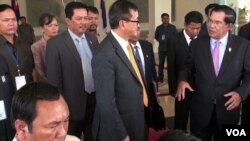Prime Minister Hun Sen on Monday rebuked opposition leader Sam Rainsy, calling his recent criticism of Cambodia’s education system “insulting.”
Hun Sen’s comments come after Sam Rainsy, the head of the Cambodia National Rescue Party, criticized the administration and its issuance of graduation certificates that are often useless. During the closing ceremony of a computer training class earlier this month, Sam Rainsy called Cambodia’s education system “very weak.”
The Rescue Party, he said, “will reorganize the country to make change, where now most sectors are zero, to help our nieces and nephews have a better future and to develop our country’s economy, to actually be prosperous.”
Hun Sen told a graduate ceremony in Phnom Penh Monday, however, that students and their parents should forgive such insults, though they should also question whether they should vote for the Rescue Party. “Once the opposition leader considers our certificates as useless, that’s looking down on all the people in the country,” Hun Sen said. “However, to Hun Sen’s eye, it is useful. You are the human resources for society and the nation.”
Rescue Party spokesman Yim Sovann said Sam Rainsy’s statements were “constructive criticism” aimed at reforming the education system, rather than an attack on the CPP.
“I think the people will have their own decision in the end, and we will let them make their own decision,” he said. “We do not want to hear the accusations, attacks, and finger-pointing at each other. We are different. We want constructive negotiation via a ‘culture of dialogue’ to resolve the country’s main issues.”
The exchange over education is just one of a series between the two parties in recent weeks. Both sides have exchanged insults in broadcast media and social media online. Last week, Foreign Minister Hor Namhong accused the Rescue Party of plotting riots in 2013 and 2014. Sam Rainsy meanwhile has written on his personal Facebook page that he expects the Rescue Party to win in 2018.
Ou Virak head of the think tank Future Forum told VOA Khmer that such public debates are normal in functioning democracies. “And they are important for more discussion, so that people can make a judgment,” he said. “This kind of debate also creates more ideas for politicians to work harder.”







